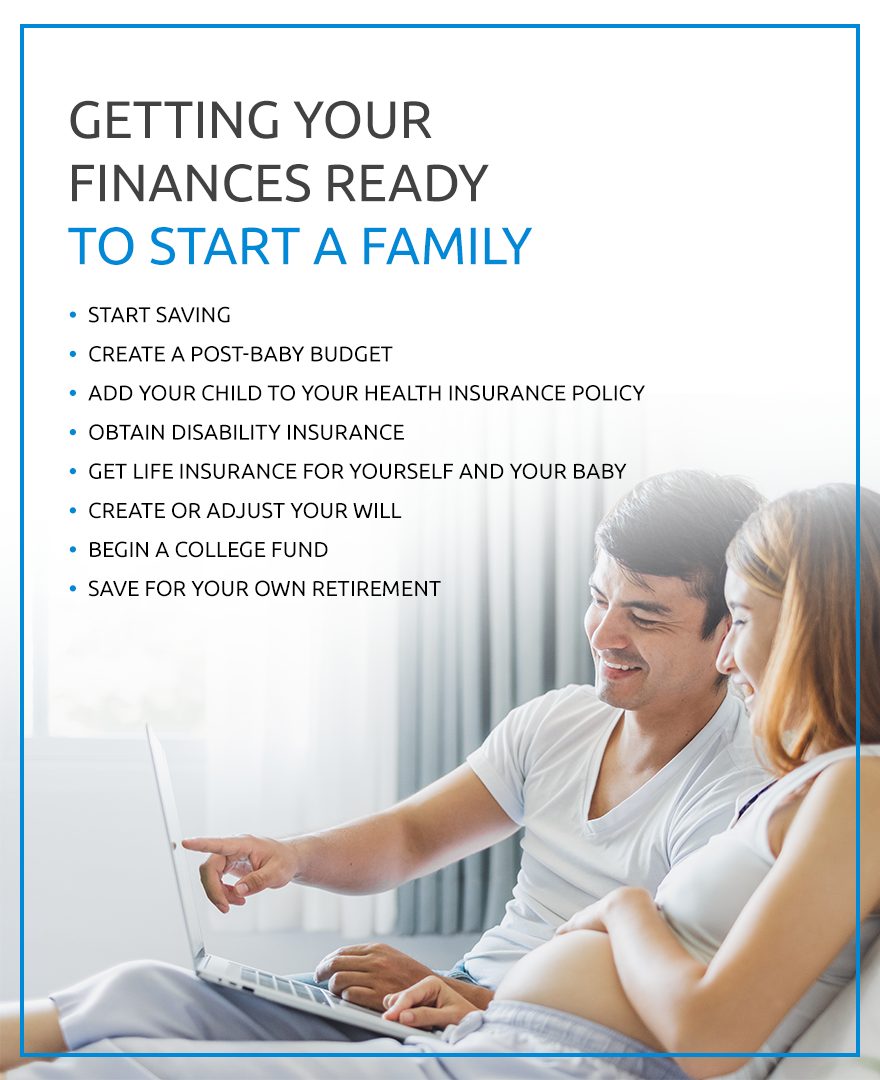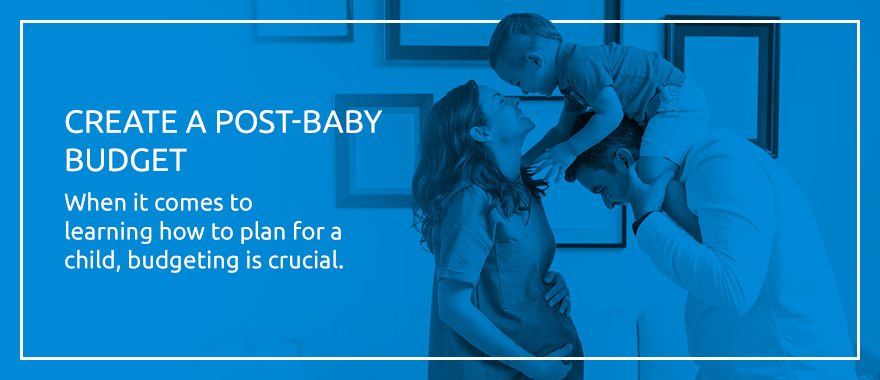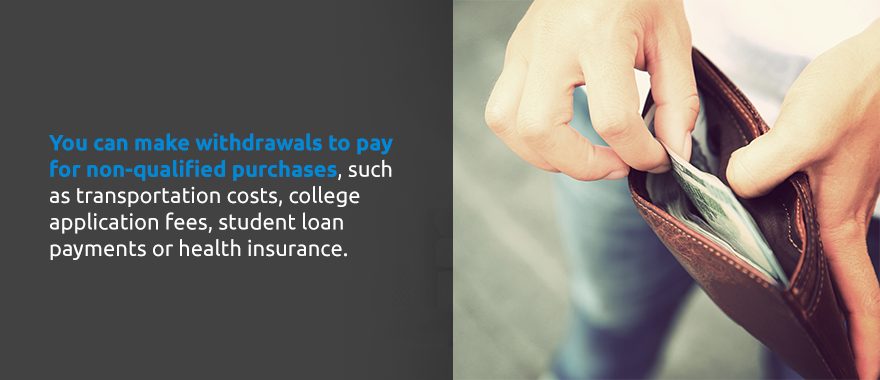If you’re expecting a baby, you may have hung your ultrasound photos on your fridge and bought some tiny, adorable clothes in preparation for the new arrival. You may also be wondering how you can save for a baby. Or maybe you’re not expecting just yet, but you’re planning to start a family soon. If so, now is the best time to start preparing for a family financially.
From creating a budget to getting the appropriate insurance to starting a college fund, we’ve compiled a guide to help you get your finances in order before the baby arrives.

What are the exact finances of having a baby? Can you anticipate the major expenses before you need to pay them? Here are the steps you’ll want to take to get your finances ready to start a family.
From an emergency fund to medical expenses, now is the time to start putting money away for the costs and bills that are just around the corner.
Half of Americans have an emergency fund that can cover three months of living expenses. If you don’t already have an emergency fund, now is the time to start saving for one. If you do have an emergency fund, you may want to reevaluate your numbers and increase that fund for the new expenses you’re likely to face by adding a new member to your family. What might have been a fully funded emergency fund for three months of living expenses before may now only cover one or two months of living expenses. Or maybe you want an emergency fund that can sustain your family longer, perhaps up to six or even nine months, to give you a bigger cushion.
Before your baby is born, make sure you fully understand your health insurance coverage and know what costs you should anticipate. Even if you have health insurance, having a baby can be quite expensive. Costs can include labor and delivery and prenatal care. You may even want to set up a separate savings account that is specifically earmarked for baby-related expenses.
You’ll also want to prepare financially for your maternity or paternity leave. Will you and your partner be able to take paid time off? Maybe only one of you will be able to take paid leave, or maybe neither of you will. Unpaid leave can have a significant impact on your household’s finances, so you’ll want to know exactly what to expect from your companies in terms of leave. If neither of you can get paid time off, you’ll want to save up enough to cover those months of reduced income.
Once you have an idea of what your expected income and out-of-pocket medical expenses will be, you’ll want to make a list of what you need to purchase and adjust your budget to include these expenses. Know what your absolute essentials are, such as diapers and bottles, and what the optional purchases are, such as a high-end stroller or designer diaper bag. If the optional items can’t fit into your budget, cut them for now. Maybe you’ll be able to purchase them down the line when you’re able to save up for them.

When it comes to learning how to plan for a child, budgeting is crucial. Your pre-baby budget will probably be quite a bit different than your post-baby budget. In your post-baby budget, you’ll need to factor in regular expenses such as diapers, food and childcare.
If you already have a budget, then budgeting for a baby may just be a matter of inputting new anticipated expenses. If your income can no longer sustain these new expenses, however, more detailed planning and life changes may need to be considered.
You may also want to step up your budget from a one-year plan to a multi-year plan. What can you expect your finances to look like in two years? Or in five years? Creating a long-term budget will help you get a visualization of what your finances will look like before or after the baby is born as well as how they will be affected over the years to come. Having this projection on hand can help you determine whether you need to make different financial decisions right now to reach your long-term financial goals.
If you’re new to budgeting, you can start with the basic rule of thumb known as the 50/30/20 method.
This is simply a rule-of-thumb, and these exact percentages may not work for your family. Maybe your needs are more than 50% of your income. Maybe you’d prefer to put 30% of your income toward your savings and debt repayment and 20% toward your wants. Maybe you want to cut down your wants to a much smaller percentage so you can save more in preparation for starting your family.
The goal is to determine what your financial obligations and priorities are and how your money can help you sustain your family and reach your goals.
There are a few steps you’ll want to tackle within the first 30 days of your baby’s life, and one of these steps is adding your baby to your health insurance plan. Before your baby is born, you’ll want to review your policy. Some employer-based plans will give you 60 days to add your child to your policy. The best course of action is to add your child as soon as possible so you can get it done and won’t have to worry about ending up with a sick baby who has no coverage.
Keep in mind that you may still be responsible for some expenses out-of-pocket, even if you have health insurance. Review your policy early so that you can ask questions and know ahead of time what expenses you can anticipate so that you can start saving for them as soon as possible.

Along with health insurance, you’ll want to obtain disability insurance if you don’t already have a policy. No matter how valuable your retirement account, car or home is, you are your most valuable asset because you can make a living. That’s why you need disability insurance. This insurance will cover a portion of your income if you are unable to work for an extended period due to an injury or illness.
If you rely on a paycheck, you should have disability insurance. Ask yourself is, “How long would my family be able to last without my paycheck?”
You can choose between short-term and long-term disability insurance. During a period in which you can’t work, both of these types of insurance replace a portion of the base salary you bring in every month.
Pay close attention to how a policy defines “disabled.” Policies vary on the terms for which they’ll pay out. For example, a policy may pay out if you’re unable to work any job that you’re qualified for. Another policy may pay out if you can’t perform in your occupation, and another may pay out only if you’re unable to work at all. Other policies also cover partial disability, so you can get a portion of the benefit if you’re able to work only part-time.
When deciding on the amount of coverage you need, take a look at your budget. How much money will you need to cover all of your expenses if you’re unable to work for several months? Since your monthly expenses will increase when you’re expecting a child, you may need a sizable amount of disability coverage.
So how exactly can you obtain disability coverage?

Even if your employer sponsors a disability insurance plan, you may still want to supplement that coverage. Buying your own disability insurance policy can allow you to choose the company with the best offers, customize your coverage, keep your coverage even if you change jobs and collect your benefits tax-free.
If you don’t already have life insurance, now is the perfect time to get it. The best time to buy life insurance is when you’re young and healthy. Life insurance is essential when you have dependents, whether that’s a spouse or a child. If someone is depending on you financially and would face hardship without your income, now is the time to buy life insurance. While you’re young and healthy, you’ll also qualify for a lower premium than when you’re older or have developed a medical condition.
A good rule-of-thumb for an expectant parent is to insure yourself for six to eight times the amount of your gross annual salary. You’ll also probably want to stick with term life insurance rather than whole life insurance, which is more expensive. A term life insurance policy of 20 years, for example, will last until your child becomes an adult and can be self-sufficient.
Besides securing life insurance for yourself, you’ll also want to consider getting life insurance for your child. You may be asking yourself, “Why do I need life insurance on my child?” No one wants to think about losing their child. As such, many parents don’t put any plans in place for the possibility of this tragedy occurring. Rates are low because the policy on a child is mainly used to cover the costs of a funeral. The most popular policy for covering a child is a term policy, which will last until they are self-sufficient.
However, some parents invest in a whole life policy for the ability to withdraw the cash value of the policy to help pay for college tuition or a down payment on a home.
Regardless of the type of insurance you choose, it is advised to speak with your insurance provider to get the best guidance for your family.

Have you written your will yet? If not, now is the time to do it. If you already have a will, adjusting your will after having a baby is essential so you can be sure that your child will be taken care of if you or both you and your spouse pass away. Who will be the guardian of your child? Who will manage your finances if both you and your spouse die? If you don’t designate a guardian in your will, that’s up to the courts to decide. Though a will is just one part of planning your estate, it’s a good first step.

You may also want to begin a college fund for your child, such as a 529 plan. 529 plans offer financial aid and tax benefits, and you can use the plan to save for elementary through high school tuition, along with college.
You can choose between two 529 plans: a prepaid tuition plan and a college savings plan.
The earnings in a 529 plan accumulate tax-deferred, which means these earnings won’t be subject to annual income taxes. When the distributions are used to pay for qualified higher education expenses, they also aren’t federally taxed.
So what exactly are qualified education expenses? Here are a few qualified expenses:
Higher education expenses can also include tuition for private elementary and secondary schools. The maximum you can withdraw tax-free every year for K-12 tuition is $10,000 per beneficiary.

You can make withdrawals to pay for non-qualified purchases, such as transportation costs, college application fees, student loan payments or health insurance. Keep in mind, though, that non-qualified purchases will incur income taxes, along with a 10% penalty on the earnings portion of your withdrawal. Fortunately, the principal portion will never incur taxes or be penalized, since that deposit was made with after-tax money.
A 529 plan can be used to cover the costs of any qualified college in the nation. For the most part, your plan doesn’t have to be invested in the state where your child ends up going to college. You can be a resident of one state, invest in a 529 plan in another state and still send your child to college in a completely different state. More than 6,000 colleges in the U.S. are eligible, and you can check if an institution is eligible.
If your child doesn’t use your 529 plan, you’ll typically pay income tax and the penalty on the earnings portion of your withdrawals. The penalty will be waived if the beneficiary goes to a U.S. military academy, is rewarded a tax-free scholarship, becomes disabled or dies. Your earnings will remain subject to federal income tax and possibly state income tax.

Keep saving and investing for your retirement even after you add a new member to your family. Sometimes the addition of a huge responsibility can throw off a parent’s long-term plans and financial goals. Remember to take care of yourself as well. Retirement is one of the biggest long-term savings goals you’ll have, so don’t get off track when it comes to saving for your own retirement after the birth of your baby.
Even if you plan to scale back your career or stop working for a few months or years, keep diligently putting money away for your retirement. Parents who stay out of work for a year or more can pay into a spousal IRA and deduct that amount from their household’s taxable income. You can pay into this IRA even if the working spouse funds a 401(k) at work. If you stick to your savings goal, you can retire comfortably, and your child won’t have to support you in your later years.
Tackle these responsibilities and goals step by step. If you start early, you’ll give yourself more time to get everything done without maxing out your stress levels. Look at the steps that are most important and tackle them first, such as making a budget for the course of the pregnancy and the first months of your child’s life.
Growing your family is an exciting experience, and being prepared financially will give you the peace of mind you need to truly relax and enjoy this incredible time in your life.
For your insurance needs in Missouri, contact David Pope Insurance Services, LLC. We have over 20 years of experience, and we can help you find the quality insurance policy that’s right for you at an affordable premium for all of your home, life, vehicle and commercial insurance needs.
We’ll get back to you quickly with answers to your questions and finished quotes. We want to help as many Missouri, Arkansas, Kansas and Iowa residents as we can, from first-time homeowners to new drivers. Request a quote today or call us at 636-583-0800 so we can help you find the coverage that’s right for you.